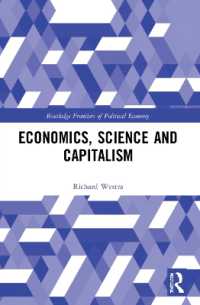- ホーム
- > 洋書
- > 英文書
- > Computer / General
Full Description
Technological Innovation and Sustainability through AI: Cutting-Edge Solutions for a Sustainable Future explores how advanced artificial intelligence (AI) solutions are being used to drive technological innovations that support sustainable development and create a more environmentally friendly future.
The book examines the intersections of AI, ethics, healthcare, social good, and the evolving future of work, offering insights into how AI is reshaping our world with a focus on sustainable development. The content ranges from foundational AI principles and ethical considerations to practical applications like machine learning for energy efficiency and smart grids.
Features:
Real-world examples and case studies, showcasing practical applications of AI in various sectors
Interdisciplinary expertise from a range of experts in diverse fields
Explores future trends and innovations, offering forward-looking insights
With contributions from a range of experts, the book offers a wide understanding of how AI can be leveraged to drive technological innovation and sustainability. It will be of great interest to academics, practitioners, and policymakers.
Contents
Chapter 01: The Nexus between Digital Transformation and Corporate Environmental Performance
Terezin Mathew
Chapter 02: The impact of sporting events on tourism attractiveness: Organization of the 2030 World Cup in Morocco
EL KARMAOUI Fatima Zahra
Chapter 03: Navigating the Pandemic with AI: Toward Sustainable Deep Learning and Machine Learning Approaches for X-Ray and CT-Based COVID-19 Detection
Youness Chawki
Chapter 04 - Improving Predictions of Student Performance and Personalized School Guidance with Hybrid Machine Learning Models: A Case Study in Cameroonian Secondary Schools
Eric Desiré KAMENI, Stephane Cédric Tekouabou Koumetio, Marlene Djoutieu TEGANKONG and Samsong Durand Priso Essawe Ndedi
Chapter 05: Improving Governance 4.0 and Bottom-Up Decision-making Approaches in Moroccan Higher Education Through Sentiment Machine Learning Analysis
Said Azelmad
Chapter 06: Experimentation in physics teaching and the contribution of artificial intelligence and virtual labs
Zineb Azar, Dardary Oussama, Malika Tridane, Said Belaaouad
Chapter 07: Integration of artificial intelligence, virtual labs, and digital simulation in science education
Dardary Oussama, Zineb Azar, Malika Tridane, Said Belaaouad
Chapter 08: REFRAMING TECHNOLOGICAL INNOVATION DIMENSION AND AI COMPETITIVENESS FOR PRO-GROWTH SMALL BUSINESSES IN SUB-SAHARAN AFRICA
Olubiyi, Timilehin Olasoji
Chapter 09: A qualitative systematic review of the influential factors for green decision-making
Mouhcine Rhouiri, Merouane El Azami El Hassani, Mohamed-Habiboullah Meyabe, Mehdi Bensouda
Chapter 10: Nexus between Renewable Energy, Artificial Intelligence, and Economic Growth: The Moroccan case
Yahya Fikria, Mohamed Rhalmaa
Chapter 11: Impact of new technologies and sustainability on maintenance in the era of Artificial Intelligence
Amal NAJI and Zitouni BEIDOURI
Chapter 12: Group work in the digital age: a survey of banking Human Resources in Morocco
Abdelaziz Berdi, Seghyar Nabil, Ahmed EL hammoumi
Chapter 13: AI-Powered Waste Management: Transforming Linear Systems into Circular Economy Solutions
Shubham Gupta
Chapter 14: AI-Driven Innovation in Waste Management and Recycling
Vinod B R, Arunakumari BN, M. Varuna, Jyothi D N
Chapter 15: Artificial Intelligence and Biodiversity Regeneration: Inclusive Strategies for Smart Cities in the Global South
Nawal Benabdallah
Chapter 16: Artificial Intelligence in Sustainable Supply Chain Management
Mohamed Badiy, Charaf Hamidi, Fatima Amounas, Zaynab Khalfi, Salma Gaou, and Abdelaaziz Hessane







